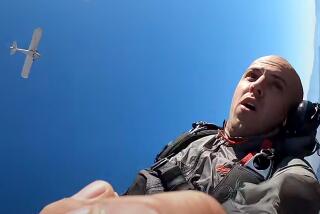Pilot in Ski Gondola Accident Convicted in Tape Destruction
- Share via
CAMP LEJEUNE, N.C. — Marine Corps Capt. Richard Ashby was found guilty Friday of conspiracy and obstruction of justice for hiding and helping destroy what could have been crucial evidence of why his jet sliced a ski gondola cable last year, killing 20 people in the Italian Alps.
That evidence, a home videotape recorded from inside the cockpit of Ashby’s EA-6B Prowler, was sneaked out of the plane by Ashby and later tossed into a bonfire by his co-pilot as they faced an international criminal investigation into the deaths at a popular ski resort.
Ashby, of Mission Viejo, Calif., was acquitted in March of all 20 manslaughter charges, but the jury in this court-martial pronounced him guilty of helping to keep the tape out of the hands of investigators looking for answers to one of the worst peacetime accidents in U.S. military history.
As Ashby stood ramrod straight in the courtroom, his mother, Carol Anderson, wept softly. At her son’s first trial, the Orange County schoolteacher jumped and shouted for joy at his acquittal. This time, after the judge warned against any courtroom outbursts, she repeated over and over to herself, “Oh, no! Oh, no!”
The same jury will determine Ashby’s punishment; the 32-year-old pilot faces as much as 10 years in prison or dismissal from the service.
“I don’t believe myself or any of the crew had a criminal mind,” Ashby told the jury Friday afternoon in the sentencing phase of the trial. “I want to do what’s right. I’ve always tried to do what’s right,” he said.
Standing before the jury box, he said he would respect whatever punishment he was given.
“As far as the Marine Corps goes and my feelings about the Marine Corps,” Ashby said, “I’ll always love the Marine Corps.”
His mother also addressed the jury.
“This has changed his life forever,” Anderson said. “He accepted responsibility for that accident. We have cried together over the lives of those 20 people.”
Shaken and tearful, she added: “I love my son.”
The jury is to begin its deliberations on punishment Monday.
Earlier in the trial, Ashby testified that he was “wrong” in not giving the videotape to authorities.
“We should have turned it over to somebody to watch,” Ashby said this week. But, he added, “I don’t think taking a personal videotape is a crime.”
Several relatives of those killed in the accident testified that the tape might have cleared up some of their lingering questions about the February 1998 accident.
Georgio Vaia of Italy lost his uncle Marcello Vaia, the 56-year-old cable car operator. “When you lose somebody dear, a dear family member, the suffering is very heavy.”
Rita Wunderlich of Germany lost her husband, Jurgen. “The open questions do not give me any peace,” she said.
The conclusion of Ashby’s second trial will end the criminal prosecution in the matter. Some relatives of the dead plan to pursue civil litigation against the crew members and the United States, but such action is likely to be delayed because complex international agreements dictate that the family members must first take their grievances to the Italian courts.
The families have complained that the United States has already paid the cable car company for its costs related to the accident but has not compensated them for their much greater losses.
Ashby was cleared of manslaughter for flying too fast and too low when his jet clipped the gondola wires, plunging the 20 people nearly 400 feet to their deaths.
A separate trial was convened on the conspiracy and obstruction of justice charges.
Testimony showed that Ashby’s co-pilot, Capt. Joseph Schweitzer, had filmed portions of the flight before impact. After landing safely at Aviano, Ashby removed the tape and placed a blank tape in the camera. He then stored the recorded video in his quarters on the base.
He wanted to watch the video but did not have the right equipment. Later, he and Schweitzer asked one of the other crew members during the flight, Capt. Chandler P. Seagraves, 29, of Nineveh, Ind., what they should do with the tape.
“I would get rid of it,” Seagraves told them. “If it were mine, I’d get rid of it.”
Seagraves was given immunity from prosecution in return for his testimony.
Schweitzer then asked Ashby for the tape, and Ashby handed it over. Sometime after that, Schweitzer told Ashby that he had destroyed the tape by tossing it into a bonfire on the base.
Manslaughter charges against Schweitzer, 31, of Westbury, N.Y., were dropped after Ashby’s acquittal on those counts. But he pleaded guilty to the same obstruction charges and was sentenced in April to dismissal from the service.
Prosecutors maintain that Ashby hid the tape and gave it to Schweitzer to be destroyed because he feared it would be used against them to show they were acting recklessly during the flight.
But Ashby’s civilian attorney, Frank Spinner, argued that Ashby never intended to thwart justice by sneaking out the videotape. He suggested, rather, that Ashby and Schweitzer were stressed after hitting the cable wires and then struggling to safely return the plane to Aviano.
“You had two Marine Corps captains caught in an international accident beyond their control,” Spinner said. “They were scared. They were fearful. They were depressed at the loss of life.
“Bad mistakes were made. Bad judgment. Poor judgment,” Spinner said.
More to Read
Sign up for Essential California
The most important California stories and recommendations in your inbox every morning.
You may occasionally receive promotional content from the Los Angeles Times.














